The history of The Troubles continues to haunt Ireland but what was striking about the New IRA's actions last week was the unity in its condemnation
There was an outpouring of disgust, grief and anger at the murder of the journalist Lyra McKee in the nationalist Creggan area of Derry last week. That was to be expected after such a despicable act.
But even more striking was the unity in condemnation from all sides of the so-called New IRA, the republican dissidents who were responsible for the shooting.
Read more: Theresa May, Leo Varadkar hear passionate plea for peace at Lyra McKee's funeral
DUP leader Arlene Foster and Sinn Fein leader Mary Lou McDonald stood shoulder to shoulder at a memorial event the next day to express their shared outrage, not something we see very often. They may not agree on much, but like everyone else here they believe we must never return to the violence that tore Northern Ireland apart for so long.

Labour Leader Jeremy Corbyn and Sinn Fein's Mary Lou MacDonald sit next to each other at Lyra's funeral.
The reaction from Sinn Fein was particularly interesting. They referred to the shooting as murder and called on anyone with information to give it to the police.
That's not something you would have heard about republican actions from anyone in Sinn Fein in the past, never mind the party leadership in the North. It reflected the shock felt by everyone, including Sinn Fein, at the awful prospect of the North being "dragged back into the past,” as the Taoiseach Leo Varadkar put it.
The shooting last week happened exactly 21 years after the Good Friday Agreement brought peace to the North following the 30 years of carnage that were euphemistically called The Troubles. The appalling vista of a possible slide back to those terrible times is unbearable to contemplate. Hence the disgust and outrage on all sides.
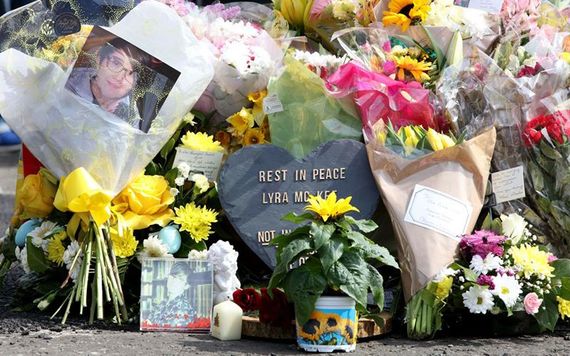
A memorial to Lyra McKee in Creggan, Derry.
But it's an uncomfortable one for Sinn Fein. They still can't bring themselves to refer to even the worst of the civilian killings they did during The Troubles as "murder." Instead, they trot out the usual equivocations about things that were "wrong" and things that "should never have happened." And they always add that people on all sides had suffered.
Read more: Family of murdered journalist ask that love not anger be her memory
The killing of McKee last week was an accident, according to the dissident republicans who were behind it. Their incompetent gunman was shooting at the police who were close to where she was standing.
So her killing was accidental. It was "wrong," just as many killings by the IRA over the years were "wrong," including the killings of women and children.
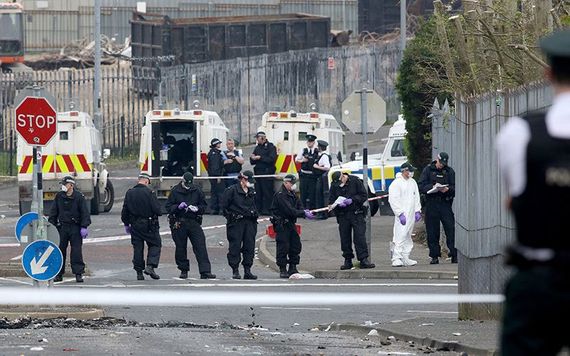
Police in Derry continue to investigate Lyra's death, which the New IRA have taken responsibility for.
In the past week, many people here have been remembering another brutal murder by republicans in Derry of a young woman who at 29 was the same age as McKee. This happened in 1981 when Joanne Mathers, who was working as a census enumerator, was collecting census forms from houses in Derry on the opposite side of the river from the Creggan where McKee was shot.
On the doorstep of one house, Mathers was fatally shot in the neck by an IRA man who had rushed up behind her. The IRA, then controlled in Derry by Martin McGuinness, disapproved of the holding of the census. So they shot her as an example and a warning.
Unlike the killing of McKee last week it was no accident; it was deliberate murder. Her baby and distraught husband were left to grieve.
These days McGuinness is regarded as a sort of latter-day saint despite the brutal campaign waged by the Provos in Derry during his time, the proxy bombings, the assassinations, the gruesome deaths of so many civilians with no connection to the security forces. We whitewash over the savagery that took place on his watch because he eventually became a peacemaker (but only when he realized the so-called war could not be won and it was futile to carry on).
The aim of us staying silent is to protect the Good Friday Agreement and preserve the peace it has brought. The aim is understandable, even laudable. But it comes at a heavy price.
That price is allowing Sinn Fein to gloss over the past, to rewrite their gruesome history and glorify those involved, to pretend that their horrific campaign was justifiable even though the vast majority of people in Ireland at the time disapproved of what they were doing.
Now and then, however, it is hard to stay silent and swallow Sinn Fein's air-brushed version of our recent history. The murder of McKee was one of those times, despite the condemnation from Sinn Fein.
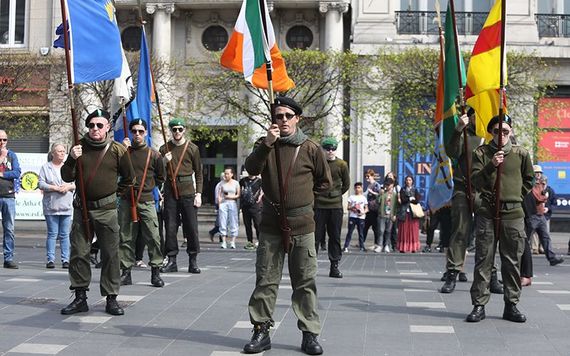
Republicans dressed in military garb marched on Dublin, for Easter, following Lyra's murder by the New IRA.
It is hard because the same justification is now being used by the New IRA, who believe that their actions are justified no matter what most people in Derry or the rest of Ireland think.
The justification is the same -- the final goal of a united Ireland supersedes everything else. The Good Friday Agreement was a betrayal of the struggle. The fight must go on.
The New IRA in Derry can claim that what they are doing now is no different than what the IRA under McGuinness did for so long. If it was justifiable then, why is it not justifiable now? That is the danger of white-washing the past, even for the sake of peace now.
It was interesting that while Foster shared in the Sinn Fein condemnation of McKee's murder, her comments were also nuanced to reflect this difficulty. "Of course violence, criminality and terrorism was always wrong," Foster said, "and it's still wrong today in 2019."
It's not often this column agrees with Foster, but she has a point. If Sinn Fein continues to glorify the violence of the IRA during The Troubles it makes it difficult for them to condemn events like the murder of McKee. It makes it harder to convince the disaffected youth in the Creggan today -- and the New IRA hard men who manipulated them last week -- to reject violence and support the Good Friday Agreement and the police.
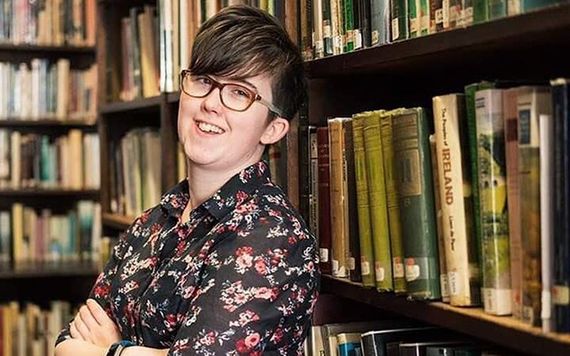
RIP Lyra McKee.
Having said that, it's important to keep the threat from the so-called New IRA in perspective. They are a very small umbrella group formed from a few strands of dissident republicans who oppose the Good Friday Agreement. They are few in number, poorly organized and trained, and don't have much money or arms.
Even so, they are capable of making serious trouble, as we have seen in recent months with a car bomb in Derry, letter bombs sent to U.K. transport hubs and anti-police violence in a few areas like the Creggan.
The main danger they pose is the trouble they can foment in deprived nationalist areas where there are youngsters who are unemployed, bored and looking for diversion and someone to blame -- with the police the traditional target, even though The Troubles were over before these kids were born.
The video of what went on in the Creggan on the night McKee died is telling. A police search in some houses for weapons (to prevent dissident trouble over Easter) had prompted a reaction from a gang of around 50 people, mainly teenagers, and a confrontation with police vehicles. Dozens of petrol bombs were thrown, just like the old days.
There was a TV crew in the area making a documentary which added to the excitement. This may have made it easier for the hard men in the background to get the youngsters wound up.
It was small scale stuff, ignored by most people in Derry and even in the Creggan itself. But it was uncomfortably reminiscent of so many nights during The Troubles which ended in tragedy, as this one did.
Security experts here think there may be no more than a few dozen activists involved in the New IRA, mainly the older diehard republicans who never accepted the peace and who miss the status and power they had during The Troubles. They also have links to ordinary criminals, and the recent spate of ATM cash machine robberies here may be partly a fundraising exercise for their movement.
In addition to this hardcore, there are a couple of hundred supporters in Saoradh, their so-called political wing, a motley crew of revolutionary dreamers and fantasists who like to dress up in army fatigues, berets and dark glasses. Some of these are in the south, and they paraded down O'Connell Street in Dublin last weekend to mark the Easter Rising, despite the murder of McKee.
The contempt that greeted them said it all, although they would probably answer that Patrick Pearse got the same reaction from Dubliners when he read the Proclamation outside the GPO in 1916.
It's the old problem - a blood-soaked history that still haunts us and allows a tiny minority to give the two fingers to democracy.
Read more: Murdered Irish journalist wrote an extraordinary letter about being gay to her 14-year-old self
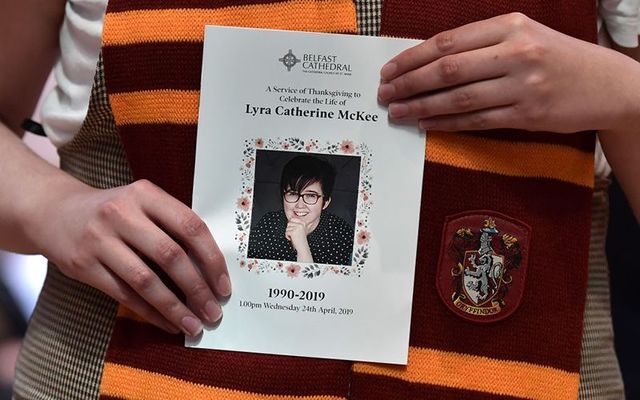
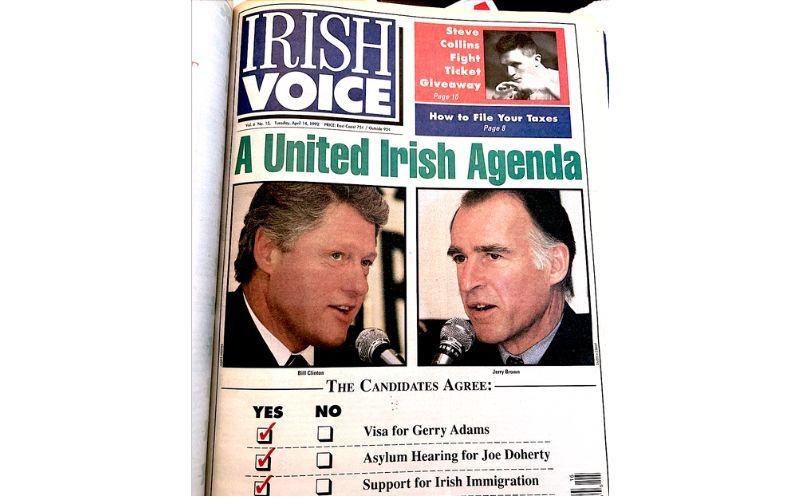
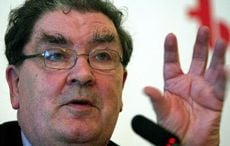

Comments